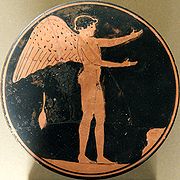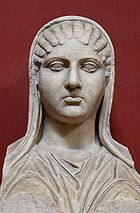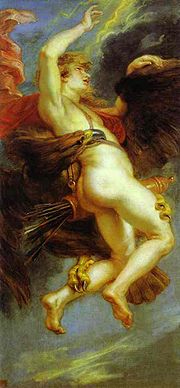
Ancient Greek eros
Encyclopedia

Ancient Greece
Ancient Greece is a civilization belonging to a period of Greek history that lasted from the Archaic period of the 8th to 6th centuries BC to the end of antiquity. Immediately following this period was the beginning of the Early Middle Ages and the Byzantine era. Included in Ancient Greece is the...
used the word eros (Greek
Greek language
Greek is an independent branch of the Indo-European family of languages. Native to the southern Balkans, it has the longest documented history of any Indo-European language, spanning 34 centuries of written records. Its writing system has been the Greek alphabet for the majority of its history;...
: ) to refer to different aspects of love
Love
Love is an emotion of strong affection and personal attachment. In philosophical context, love is a virtue representing all of human kindness, compassion, and affection. Love is central to many religions, as in the Christian phrase, "God is love" or Agape in the Canonical gospels...
. This diverse range of meanings is expressed by the plurality of Greek words for Love
Greek words for love
There are several Greek words for love, as the Greek language distinguishes how the word is used. Ancient Greek has four distinct words for love: agápe, éros, philía, and storgē. However, as with other languages, it has been historically difficult to separate the meanings of these words...
, reflecting the versatility and complexity of eros. The term was used to describe not only the affectionate marital relationship between a man and a woman but also the institution of pedagogic "pederastic" relations
Pederasty in ancient Greece
Pederasty in ancient Greece was a socially acknowledged relationship between an adult and a younger male usually in his teens. It was characteristic of the Archaic and Classical periods...
(Eros paidikos, παιδικός ἔρως), solemnized in certain Greek poleis
Polis
Polis , plural poleis , literally means city in Greek. It could also mean citizenship and body of citizens. In modern historiography "polis" is normally used to indicate the ancient Greek city-states, like Classical Athens and its contemporaries, so polis is often translated as "city-state."The...
. Such was the importance of eros for the ancient Greeks that the god of love, also named Eros, was held in Hesiod's cosmogony to be the primordial deity, the first god, older than all the others.
Ancient Greek philosophers were also interested in the conception of eros, which became a central issue in their analyses. In particular, Plato
Plato
Plato , was a Classical Greek philosopher, mathematician, student of Socrates, writer of philosophical dialogues, and founder of the Academy in Athens, the first institution of higher learning in the Western world. Along with his mentor, Socrates, and his student, Aristotle, Plato helped to lay the...
devoted two of his dialogues, Phaedrus
Phaedrus (Plato)
The Phaedrus , written by Plato, is a dialogue between Plato's main protagonist, Socrates, and Phaedrus, an interlocutor in several dialogues. The Phaedrus was presumably composed around 370 BC, around the same time as Plato's Republic and Symposium...
and Symposium
Symposium (Plato)
The Symposium is a philosophical text by Plato dated c. 385–380 BCE. It concerns itself at one level with the genesis, purpose and nature of love....
, to the philosophical dimensions of love, and in particular pederastic love
Pederasty in ancient Greece
Pederasty in ancient Greece was a socially acknowledged relationship between an adult and a younger male usually in his teens. It was characteristic of the Archaic and Classical periods...
. In Phaedrus, the best eros of a man for a boy is said to be a form of divine madness that is a gift from the gods, and that its proper expression is rewarded by the gods in the afterlife; the Symposium details the method by which love takes one to the form of beauty and wisdom. The term Platonic love
Platonic love
Platonic love is a chaste and strong type of love that is non-sexual.-Amor Platonicus:The term amor platonicus was coined as early as the 15th century by the Florentine scholar Marsilio Ficino. Platonic love in this original sense of the term is examined in Plato's dialogue the Symposium, which has...
derived from the philosopher's influential writings, and describes the passionate but chaste love of a man for a youth.
Marital eros

In Athens the dominance of man in the marital relationship is expressed by stories like one involving the prominent Greek statesman and general Alcibiades
Alcibiades
Alcibiades, son of Clinias, from the deme of Scambonidae , was a prominent Athenian statesman, orator, and general. He was the last famous member of his mother's aristocratic family, the Alcmaeonidae, which fell from prominence after the Peloponnesian War...
; Alcibiades was married to Hipparete
Hipparete
Hipparete was the daughter of Hipponicus III, a wealthy Athenian. She was married circa 424 BC or earlier to the prominent Athenian statesman and general Alcibiades.-Background:...
, the daughter of Hipponicus
Hipponicus
Hipponicus was an Athenian military commander and son of Callias II and father of Callias III and Hipparete, who later married Alcibiades. Together with Eurymedon he commanded the Athenian forces in the incursion into Boeotian territory and was slain at the Battle of Delium ....
, a wealthy Athenian. According to the biographer Plutarch
Plutarch
Plutarch then named, on his becoming a Roman citizen, Lucius Mestrius Plutarchus , c. 46 – 120 AD, was a Greek historian, biographer, essayist, and Middle Platonist known primarily for his Parallel Lives and Moralia...
, Hipparete loved her husband, but she attempted to divorce him because he consorted with courtesan
Courtesan
A courtesan was originally a female courtier, which means a person who attends the court of a monarch or other powerful person.In feudal society, the court was the centre of government as well as the residence of the monarch, and social and political life were often completely mixed together...
s. She lived with him until her death and gave birth to probably two children, a daughter and a son, also named Alcibiades. Another famous relationship between a man and a woman in ancient Athens was the romantic involvement of Aspasia
Aspasia
Aspasia was a Milesian woman who was famous for her involvement with the Athenian statesman Pericles. Very little is known about the details of her life. She spent most of her adult life in Athens, and she may have influenced Pericles and Athenian politics...
with the Athenian
Athens
Athens , is the capital and largest city of Greece. Athens dominates the Attica region and is one of the world's oldest cities, as its recorded history spans around 3,400 years. Classical Athens was a powerful city-state...
statesman Pericles
Pericles
Pericles was a prominent and influential statesman, orator, and general of Athens during the city's Golden Age—specifically, the time between the Persian and Peloponnesian wars...
. Aspasia was born in the city of Miletus
Miletus
Miletus was an ancient Greek city on the western coast of Anatolia , near the mouth of the Maeander River in ancient Caria...
in Asia Minor
Asia Minor
Asia Minor is a geographical location at the westernmost protrusion of Asia, also called Anatolia, and corresponds to the western two thirds of the Asian part of Turkey...
and was possibly a hetaera
Hetaera
In ancient Greece, hetaerae were courtesans, that is to say, highly educated, sophisticated companions...
(Hetaerae were professional high-class entertainers, as well as courtesan
Courtesan
A courtesan was originally a female courtier, which means a person who attends the court of a monarch or other powerful person.In feudal society, the court was the centre of government as well as the residence of the monarch, and social and political life were often completely mixed together...
s). She became the mistress of the Athenian in the early 440s and, after he divorced his first wife (c. 445 BC
445 BC
Year 445 BC was a year of the pre-Julian Roman calendar. At the time, it was known as the Year of the Consulship of Augurinus and Philo...
), began to live with him, although her marital status remains disputed.
In Sparta
Sparta
Sparta or Lacedaemon, was a prominent city-state in ancient Greece, situated on the banks of the River Eurotas in Laconia, in south-eastern Peloponnese. It emerged as a political entity around the 10th century BC, when the invading Dorians subjugated the local, non-Dorian population. From c...
the social status of women was stronger and the marital rituals were solemnized. There was an elaborate preparation for the first night after the marriage, while the man in a symbolic rite had to abduct his future wife before the official ceremony, while she had her hair cut short and dressed in boy's clothes. The ideal outcome of marital eros in Sparta was the birth of a healthy boy.
Eros paidikos

Ares
Ares is the Greek god of war. He is one of the Twelve Olympians, and the son of Zeus and Hera. In Greek literature, he often represents the physical or violent aspect of war, in contrast to the armored Athena, whose functions as a goddess of intelligence include military strategy and...
and to many legendary figures (Previously existing myths, such as that of Achilles
Achilles
In Greek mythology, Achilles was a Greek hero of the Trojan War, the central character and the greatest warrior of Homer's Iliad.Plato named Achilles the handsomest of the heroes assembled against Troy....
and Patroclus
Patroclus
In Greek mythology, as recorded in the Iliad by Homer, Patroclus, or Patroklos , was the son of Menoetius, grandson of Actor, King of Opus, and was Achilles' beloved comrade and brother-in-arms....
, were also cast in a pederastic light). The institution has its roots among the Dorian Greeks, where it was a recognized institution. According to Plato the Dorians were the first who even gave a pederastic meaning to the myth of Ganymede
Ganymede (mythology)
In Greek mythology, Ganymede is a divine hero whose homeland was Troy. Homer describes Ganymede as the most beautiful of mortals. In the best-known myth, he is abducted by Zeus, in the form of an eagle, to serve as cup-bearer in Olympus. Some interpretations of the myth treat it as an allegory of...
.
In Sparta the relation between the erastes (εισπνήλας was the Spartan word) and the eromenos (αΐτας) was not only legal but required by law, and the erastes was regarded as a guardian of the eromenos and was held responsible for any wrongdoings of the latter. Crete is regarded as the birthplace of eros paidikos. Researchers of the Spartan civilization, such as Paul Cartledge, remain uncertain about the sexual aspect of the institution. Cartledge underscores that the terms "εισπνήλας" and "αΐτας" have a moralistic and pedagogic content, indicating a relationship with a paternalistic character, but argues that sexual relations were possible in some or most cases. The nature of these possible sexual relations remains, however, disputed and lost to history.
According to the Greek classicist Ioannis Sykoutris, paidikos eros was interconnected with the notion of education (αγωγή) and usually resulted in longlasting friendly relationships. The role of pedagogic pederasty in ancient Greek society degrades after the 4th century BC, when the organization of polis becomes more loose and the "citizens" become "subjects" and, therefore, do not cultivate the virtues eros offers to a Greek.

